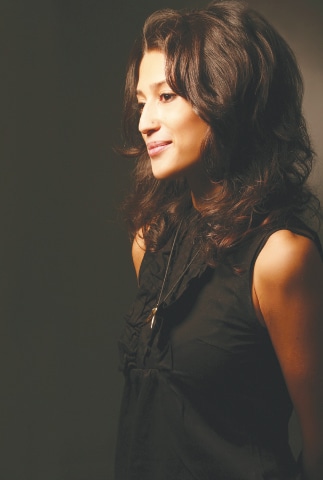
After a spell of five years, Fatima Bhutto is back with her second work of fiction, The Runaways. Set largely in Karachi and Portsmouth, it is the story of three young people, all trapped in the blueprint of a future dreamed up by their parents. Bhutto describes The Runaways as a story about young people and millennial confusions, about trying to form a sense of self in opposition to the world, and yes, about radicalisation. Bhutto speaks to Eos about why she was cautioned against writing the book in the first place and how she might have ruined her search history forever in researching it.
The Runaways grapples with issues that play out in the news almost every day, such as migration, sexual identity, religious extremism and faith. What sparked the idea for the book?
I started thinking about this story in 2014. It was that summer when ISIS had really captured the news, and anywhere you went and anything you read you had these horrific stories, this new face of terror. These were stories we’d been watching for 10 years or so, but it was so much worse, so much scarier, because this time, it was young people, it was global, it was slickly produced. It didn’t come with old grainy videos, but these Hollywood-style visuals. I started thinking about what it takes for young people to be radicalised and what radicalisation means. There seems to be this idea about radicalisation, especially in the West, where it is almost like a fever. You wake up one morning with it and you’re sick. But it’s really a series of many humiliations and many isolations that does that to a person. It’s not one thing. So I had started to think about that, but I was largely dissuaded from writing about it by my literary agents.
Why were they hesitant about this book?
They weren’t hesitant, they just said, “Don’t do this.” It was a flat out ‘no’.
But isn’t there definitely an audience wanting to understand extremist thought or the violence it inspires?
That’s what I would have assumed too, but I think there’s a general terror about not wanting to understand these things. It’s really just enough to be afraid of them. There’s no real effort to understand or observe or investigate. It’s just this cyclical repetition of horror story, panic, fear, horror story, panic, fear. And novels are essentially compassionate forms. They are small, intimate examinations, and to do that you’d have to ask questions about the person you’re meant to be afraid of. And I think that was the fear. Nobody really wants to know that the radicalised are just as pained as their victims; those at the forefront of violence are just as brutalised by it as the people they inflict it upon, I think. When I gave the first draft to my agents, they said, “No way, no thank you.” I remember being told that nobody wants to read about people like this. And I thought well, actually, I do. So I ignored them and kept working.
How did you change their mind?
It becomes like a mania when you’re working on a novel. Your mind is always circling these places and these people you’ve started to form. So I kept working for another four years and by the time I showed it to them again, the book was in a different state. I don’t know if they’re convinced about it even now! But I remain more convinced and curious and interested in those worlds and those people.
Do you worry about the reaction from readers?
If you start worrying about reactions, you start writing for reactions. I’m curious, but not worried.
How did your three main characters come to be?
The Runaways was initially just 30,000 words. It was really only about Monty and Sunny. My first readers said it was too small, and you didn’t really know where these characters came from. And so I went back and rewrote it and rewrote it… I’ve lost track of how many drafts I did, but at one point it was a satire, then it was almost too funny and we had to take out all the funny bits; at another point it was too tied to current events, so I had to scrap all the real-life references. I mean, I don’t even know if I’m a writer, I’m a rewriter at this point. But for me, the heart of the book is two people: Sunny and Anita. I’m sure Sunny is probably the hardest for other people to sympathise with, but I did, and I was most curious about him, most worried for him, and most attached to him. I felt a real solidarity with him, with his loneliness and how painful it feels not to belong in a place, especially because you may feel that’s the only place you have or feel you deserve to belong and you don’t. Anita was the last character, born in the last year of the work. I loved her because of Karachi. What I loved about her is what I love about home: how it builds you and makes you even in all the upsets and turbulence. It creates a certain defiance in the people it throws around. Anita had my heart for that reason, whatever else she does.
Tell me about your research.
I did a deep dive into websites such as LiveLeak, which is like an alternative YouTube, so it’s got all the panda sneezing videos, but it’s also got the war in Syria and constantly updated videos that the rebels put out. In 2014, they also hadn’t shut down all the Tumblrs, Reddits and Twitter accounts that had that kind of stuff. What amazed me in the research was not the violence. If you look up videos of American soldiers walking through Fallujah, if you listen to the audio of the American bombers when they’re targeting people, the things they are saying are not very different from the things ISIS is saying. So the violence was not surprising, but what shocked me was how similar they were.
We always view this turmoil as a religious thing, but to me it’s not. The guys who are out in Syria have a lot of the same millennial confusion and anger that young people have anywhere else. It’s just set against the backdrop of extreme inequality and extreme disorder. But a lot of it comes from the same wanting: to be famous, to be special, to be significant, to have a following. They are obsessed with likes, with viral videos, with the sharing, and that was really surprising to me. It used to be that those groups depended on or survived on secrecy, but today nobody wants to be secret, everyone wants to be famous. You don’t have to be famous for anything good either. You want to be watched, it doesn’t matter doing what. That, for me, was the real education of the research.
The book also explores what it means to be a man today, how a man might think or move through the world. Did you find that difficult to do?
It wasn’t difficult. Once I have the idea for a character, I get very swept up in them. Watching the way in which masculinity is in crisis today, what does it mean to be a man? What does it mean to someone like Monty or Sunny, who have a very particular idea of what it means to be a man, and they suddenly wake up and the world has changed and that meaning is transformed not just immediately, but constantly and aggressively? How does that person catch up? Is that required?
Some people seem disappointed that your new book isn’t another non-fiction book.
I understand. Because non-fiction is perceived as being more personal, so people would want that more from me, but fiction is quite personal and reflective of one’s thoughts and moods. If it’s any consolation I can say that the next book will be non-fiction.
I think people will look for clues about your world or life in this book, particularly the sections that deal with the Karachi American School or the life of the rich in Karachi.
When people read fiction as a guide to your life, they’re often sorely disappointed. For instance, one of my father’s friends once introduced me to a gentleman from Peshawar. A couple of months later, I asked about the man and how he was, because there had been a string of bombings in Peshawar. And my father’s friend mentioned that the man and his sons would now each go to a separate mosque to pray on Fridays. And that idea bothered me — disturbed me — so much. I just couldn’t stop thinking about it and it eventually turned into The Shadow of the Crescent Moon. So the parts of my life that are in my fiction are things like that, which nobody can really sleuth their way to. The things I’m immediately upset or enraged about, I will then turn to non-fiction. But the things I’m more deeply disturbed by, I can only get out in fiction.
Published in Dawn, Books & Authors, October 7th, 2018














































Dear visitor, the comments section is undergoing an overhaul and will return soon.